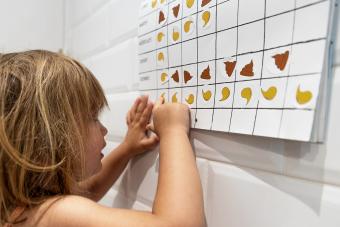
Nighttime potty training is the last big hurdle in the potty training process. This can seem scary for toddlers and parents alike, but it's actually easier than you think. The key is starting at the right time and getting into a routine.
Don't worry - you'll be sleeping soundly in a diaper-free home soon! We break down how to potty train at night and give tips from real-life moms to help you find success.
When Can My Toddler Start Nighttime Potty Training?
Unlike during the day, nighttime toilet training requires a mature bladder. According to health experts, "children normally gain control over their bladders somewhere between ages 2 and 4-each in their own time. Occasional wetting is common even in 4- to 6-year-old children."
What this means is that when you start this portion of your potty training journey will be completely dependent on your child. Starting before your child is ready will lead to struggles and a lot of accidents, so it is always best to wait until they are showing signs of readiness.
Signs of Overnight Potty Training Readiness
Your child is ready to start potty training at night if they show these signs:
- They are using the potty regularly during the day.
- They commonly wake up with a dry or barely damp diaper in the morning.
- They are removing their wet diapers at night.
- They are waking up and asking to go potty in the middle of the night.
- They are asking to wear underwear to bed.
How Long Does Nighttime Potty Training Take?
The answer to this question is also dependent on your child. For some, it clicks in just a few days and for others it can take weeks to months. It is best for parents to prepare for the latter and to go into this venture with the expectation that accidents will happen.
Want to get a quick gauge on how long your child's nighttime potty training may take? Give your mom and dad a call and ask how long you and your siblings took to potty train at night! Bedwetting tends to run in families and this might give you a better idea of what to expect.
How to Potty Train at Night: 4 Easy Steps to Success
If you want to help your toddler potty like a rockstar all night long, follow these four simple steps!

1. Get a Handle on Daytime Potty Training
While you can start daytime potty training and nighttime potty training at the same time, by waiting until your little one has a good handle on going potty during the day, you will make nighttime potty training easier on everyone.
Whether girls or boys, we advise waiting three to six months after they are fully daytime potty trained before diving into this part of toilet training.
If you want to start nighttime potty training, your child must also be in a big kid bed. Without full access to their potty, this venture will be unsuccessful. Thus, get them comfortable sleeping through the night out of a crib before starting this process.
2. Toddler-Proof Your Home and Bathroom
Nighttime potty training requires a little bit of trust, but you don't want your toddler taking over the house while you sleep. Parents can easily remedy this by blocking off a hallway with baby gates so that your toddler can get to and from their potty, without getting into much else. Also, make sure that any areas they do have access to are fully babyproofed to ensure their safety.
If you are nervous about your toddler being in the bathroom by themselves, then move your training potty to a tile or wood hallway! We recommend putting puppy pads underneath the toilet to help to limit any messes.
3. Set a Consistent Morning and Nighttime Schedule
The essence of nighttime potty training is getting your child to hold their bladder through the night or to recognize when they need to wake in order to alleviate their need to pee or poo. The easiest way to help them with this life lesson is to set a routine.

- Cut off liquids one hour before they go to bed.
- Have them go potty 30 minutes before bedtime, and again, right before they go to sleep.
- Remind them that if at anytime they need to use the bathroom in the night, they just have to get up and go! It's also good to let them know that you are available if they need any help.
- In the morning, get them in the habit of waking up and immediately going potty.
If your child is typically quick to go to sleep, you can wake your child right before you go to bed to let them try one more time. However, if it takes your toddler a while to drift off to sleep, this can be disruptive to their rest, so if that's the case, you might want to avoid it.
4. Celebrate Their Successes
This is quite possibly the most important part of the process. Whenever your child wakes up dry or you arrive to their training potty to see that they made a successful visit in the night, make a big deal about it!
Positive reinforcement is a fantastic tool for making this a permanent habit. Potty training charts can also help you highlight this accomplishment.
Overnight Potty Training Tips From Real-Life Moms
Nighttime potty training can be a struggle for some, so we reached out to some real-life moms who have successfully made it to diaperless days! This is the advice they gave:
- Age doesn't matter - only readiness!
- Avoid starting nighttime potty training when other big changes are happening.
- Invest in a waterproof mattress protector.
- Keep extra sheets and towels by the bed for when accidents occur.
- Make sure their path to the bathroom or the potty is well lit.
- Don't scold when accidents happen. They are not intentionally wetting the bed.
- In this instance, change the sheets and their clothes, let them try going potty again, and put them back to sleep. Let them know it is okay and you will continue working on it.
When Is Bedwetting a Problem?
The Mayo Clinic notes that parents should not worry about bedwetting until their child reaches the age of seven. It's normal for this part of potty training to take longer than the daytime portion.
However, if your toddler goes from successfully potty training through the night to suddenly having regular accidents, it is best to call their pediatrician. This could be a sign of an underlying condition, like a urinary tract infection, which will require treatment.
Overnight Potty Training Takes Patience
The hardest part of nighttime potty training is the wait for it to be over! Remember that consistency is key and patience is a virtue. It can be difficult and frustrating, but it's well worth the time and effort. Your child's diaper days will be behind you before you know it.







